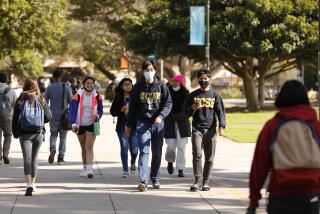Nobel Prize Inflation Hits University of Chicago
- Share via
Fuzzy math appears to have infiltrated the counting of Nobel prizes as well as the presidential campaign.
When University of Chicago professor James J. Heckman won the Nobel Memorial Prize for Economic Science last week, his university was quick to proclaim that Heckman was the institution’s 72nd Nobel laureate.
Though the University of Chicago is noted for its number of Nobel winners, it turns out to use a counting method that might not pass the rigors of its well-regarded economics department.
Just 17 Nobel laureates received their prizes while members of the university’s faculty. The remainder were students, faculty or researchers at the University of Chicago at some point in their careers--though not necessarily when they won the prize, or when they did the research that won them the award.
“It’s not the most modest way to count Nobels,” said Paul Samuelson, a Nobel laureate and economist at Massachusetts Institute of Technology in Cambridge, Mass. Samuelson is claimed by both MIT and the University of Chicago, where Samuelson earned his undergraduate degree. Heckman shared the prize last week with UC Berkeley’s Daniel L. McFadden for their work on “theory and methods widely used in the statistical analysis of individual and household behavior.”
Berkeley credited itself for 17 prizes. But it uses a more conservative counting method, crediting itself for a Nobel only when one of its faculty members or emeritus faculty members wins, according to Janet Gilmore, a UC Berkeley spokeswoman.
If it used the University of Chicago method, Berkeley would at least double its tally.
University of Chicago officials are unapologetic about trumpeting their Nobel links, pointing out they never claimed to have 72 professors win the coveted award. The university even sells a shirt listing all 70-plus Nobel laureates.
Their “official” list of prize winners includes Kenneth Arrow, who won the economics prize in 1972 while at Harvard. He taught for one year--1948-49--at the University of Chicago. He spent the next 19 years at Stanford University, before heading to Harvard.
“There are a lot of ways to count. As long as you are consistent, that is the key,” said Larry Arbeiter, the University of Chicago official who tracks the prizes.
“As long as we are clear about the criteria, there is room for multiple claims.”
The University of Chicago is not alone in Nobel inflation.
Cambridge University in England, which also uses the most liberal of counting methods, credits itself with more Nobels than the University of Chicago--74.
“The Harvard figure is somewhere around 40 but that includes Henry Kissinger, who won the Nobel Prize for peace when he was secretary of State and who never returned to Harvard,” said Dale Jorgenson, a Harvard University economist and member of the Royal Swedish Academy of Sciences, which awards the Nobels.
Jorgenson said there are no “hard and fast rules” to Nobel counting. The University of Chicago is the most aggressive counter, Berkeley is on the conservative side and Harvard is in the middle, he said.
Indeed, the number of Nobel laureates claimed by universities is probably greater than the actual number of awards made since the first prize in 1901. The awards were the idea of Swedish industrialist and dynamite inventor Alfred Nobel, who died in 1896.
Nobel counting gets even more confusing when a professor wins for work done over a long career at several institutions. McFadden, for example, joined Berkeley in 1963, but left for a 13-year stint at MIT in 1978, before returning to Berkeley, where he now teaches.
Earlier this week, it looked as if even the University of Chicago had its limits. As of Wednesday, the university had yet to list McFadden as one of its winners. McFadden was a visiting professor there in 1967. But when he learned of the omission Wednesday, Arbeiter said the university would add McFadden.
“That leaves us only one behind Cambridge,” Arbeiter said.
More to Read
Sign up for Essential California
The most important California stories and recommendations in your inbox every morning.
You may occasionally receive promotional content from the Los Angeles Times.











